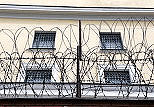First 13 Businessmen Released in Economic Amnesty

(RIA Novosti – MOSCOW, July 23, 2013) The first thirteen businessmen have been set free in Russia as part of an economic amnesty for white-collar criminals that came into effect earlier this month, business ombudsmen Boris Titov said Tuesday.
“As of now, 13 people have been released under the amnesty,” Titov told reporters. Eight people have left pre-trial detention centers and five have left prisons, he added.
The amnesty, which began on July 4, is due to be implemented over the next six months and will pardon first-time offenders convicted of economic crimes, as well as those who have not yet been sentenced.
The number of those expected to be affected by the measure, which was announced by President Vladimir Putin during the St. Petersburg Economic Forum last month, has been continually revised downwards.
Titov originally said the amnesty would affect 100,000 people, including 13,500 people serving prison sentences. But the list of crimes that the amnesty covers was reduced by the State Duma when the legislation was under consideration, and Titov said Tuesday that he expects just “thousands” to be freed from detention.
“We have never spoken about hundreds,” Titov said, adding that most of those eligible were entrepreneurs under investigation in criminal cases who were not necessarily being held in pre-trial detention.
Despite much speculation that high-profile prisoners could be included in the amnesty – such as former oil tycoon Mikhail Khodorkovsky, or opposition leader Alexei Navalny, who was given a five year prison for embezzlement last week – Titov said this would require legal changes.
“An economic amnesty is a systemic step. No individual people can have separate decisions [taken on their behalf],” Titov said.
A decision to hold an amnesty is the exclusive prerogative of the Duma, the lower house of Russia’s parliament, and the document does not need the approval of the upper house of parliament the Federation Council or the signature of the Russian president.
The process of carrying out the amnesty is being slowed by foot-dragging from government agencies and the legal requirement that those who are freed must first pay financial compensation, Titov said.
“I hope that that the tempo will quicken,” he told RIA Novosti. “We must work constantly with the authorities because there is, of course, resistance and unwillingness, especially from below. We have to deal with each case on an individual basis.”
[featured image is file photo of Russian jail exterior]
